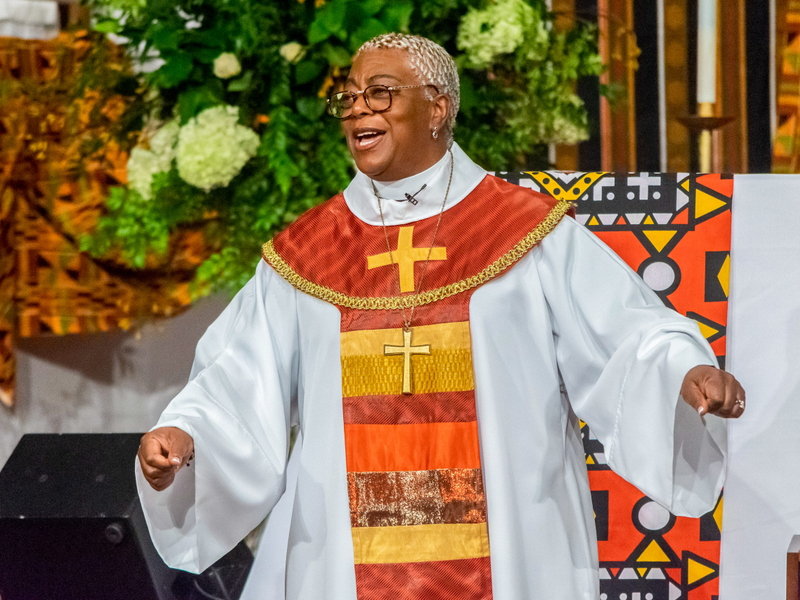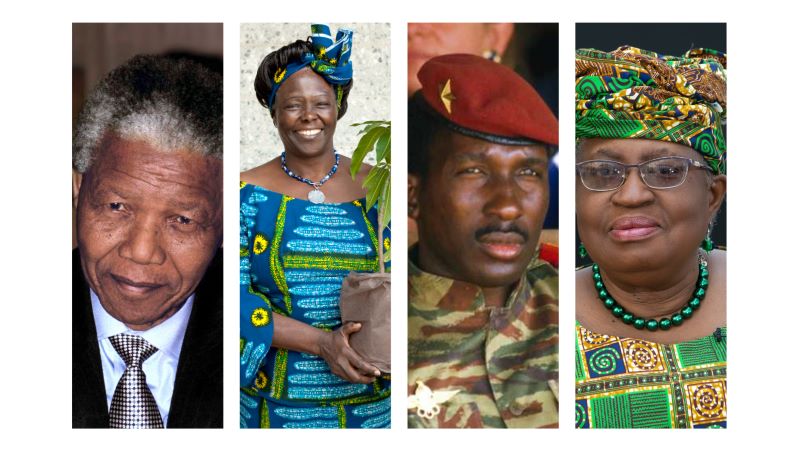
A Candid Conversation with the First Elected African-American Woman Bishop in the History of the Lutheran Church—Rev. Patricia Davenport
A few days ago, I completed reading Thabiti Anyabwile’s uplifting and fascinating book, “The Faithful Preacher: Recapturing the Vision of Three Pioneering African-American Pastors”. The book not only gave me a fresh perspective on church missions, but encouraged me to ponder the election of Rev. Patricia Davenport, the first African-American woman elected Bishop in the history of the Lutheran Church.
Bishop Davenport’s love for the course which she has embarked indicates her commitment to Christ Himself and the declaration of His divine glory to a sinful world. Her prudence and thoughtfulness of the delicacy of the commission she is charged with, has made her a spiritual watchwoman. The few moments spent in her company affirmed her vigilance, alertness and unquestionable concern for the welfare and spiritual growth of the flock she is entrusted to nurture.
With virtually 2000 supporters, well-wishers and members of the Lutheran family congregating in the New Covenant Church in Mount Airy, Philadelphia, all hoping to witness an historic event, Bishop Davenport modestly referred to it as a “surreal moment.” Humbled by her selection to serve in a capacity she never envisioned, Bishop Davenport reiterates the solemn importance of faithfulness in Gospel ministry and warns against a carefree attitude toward work as ministers, and ambassadors of Jesus Christ.

“There were people from different walks of faith gathered. There were colleagues that came from across the country to be a part of this historic moment in time. And we prayed. We praised. We communed together, and we danced. It was just an awesome time,” the bishop said at her induction ceremony.
Bishop Davenport reminded attendees that, “If the Church will uphold as it’s ideal the model of faithfulness and love toward God and fellow humans, those that answer the call should be willing to pour themselves out for the benefit of the Lord’s sheep. Men and women of such mold are gifts to the church from her LORD. In these contemporary times of ours, the Lord has indeed given such a gift to the Church.”
Emphasizing how the Southeastern Pennsylvania Synod of the Lutheran Church has been receptive to racial diversity, she cites her installation for the apostolic succession of the laying on of hands. For the first time in history, Black churches were allowed to participate in the ceremony.
“So, for Bishop Guy of the Church of God in Christ to be present, for the Black Clergy of Philadelphia to have a representative present and be a part, including our Presbyterian sister church with our Jewish brothers and sister in this space—to have that happening, says that God is up to something. God is the one who is tearing down these denominational walls and these racial walls so that we might be the kingdom of God here on Earth,” the bishop said.
In her September reflection letter to the Evangelical Lutheran Church of America (ELCA), presiding Bishop Elizabeth Eaton wrote: This year we elected six bishops—all of them women, one Latina, and the first two African-Americans. Guided by the Spirit, the people of the Southeastern Pennsylvania Synod elected Patricia Davenport and the South-Central Synod of Wisconsin elected Vivian Thomas-Breitfield. It took 31 years—not quite 40. What didn’t seem possible a generation ago is a reality in our Church. We are becoming a generation not quite arrived at the promised land but seeing God declaring, “Now you will see if my word will come true for you or not.”
We asked if Bishop Davenport ever dreamt of becoming the first female African American bishop in the history of the ELCA. In a surprise gesture, the bishop quickly got up, went to her office and returned with an impressively decorated collage. In the frame were portraits of herself and her staff, all attired in diverse professional outfits. As she looked at the collage put together by her staff almost twenty years ago, we soon realized that dressing in a bishop regalia with staff in her hand, was prophetic.
“Though I was a reluctant and hesitant candidate initially and went on to win the election, I now look back at this collage as an affirmation of what the Lord had predestined for my life years back,” she explained with a countenance of humble conviction.
The challenges of the office were not lost on her. As she took up the mantle from Rev. Claire SchenotBurkat who had served two terms, Bishop Davenport remained mindful of the daunting tasks ahead. She was cognizant of the fact that for the church to survive and carry out its mission, it has to address such problems as dwindling membership, financial constraints, authentic Christian leadership, disaffected youths leaving institutional religion, and shuttered sanctuaries, among others.
As a longtime synod official, the new bishop is quite familiar with the difficulties the ELCA is currently facing, especially the 90,000-membership under her authority. According to her, making the church more humane will be her priority.
Instead of the Church giving “hand-outs” it will shift to “hand-up,” which goes beyond the ordinary generous gesture. Her new approach will transition into
PULLOUT: “We’re not just going to provide our people with hot meals in soup kitchens but actually help them place food they have worked for on their own tables in their homes,”
empowering the less fortunate in the community. The bishop is striving to accomplish the empowerment of congregants and other members in the various communities. Assisting folks to maximize their God given gifts to attain self-reliance and independence is one of Bishop Davenport’s burning desires for her people.
“We’re not just going to provide our people with hot meals in soup kitchens but actually help them place food they have worked for on their own tables in their homes,” she stressed.
Speaking of believers with one foot in the Church and the other in the secular world, Davenport again emphasized the importance of home visits by the clergy. She is encouraging all Christians to actualize their Christlikeness in their daily living. She explained that hearing and reading the good news about Jesus Christ is indeed wonderful but having a personal relationship with the risen Lord and experiencing Him in a unique way is far more rewarding.
When asked whether her honeymoon was over, Davenport, with a bright smile, light-heartedly said it was far from over. With continuous support and encouragement from her Lutheran family, she looks forward to basking in the bliss of that love for a long time.
In “Sister Citizen”, Melissa Harris-Perry writes, “…Black women attempt to stand upright in a room made crooked by the stereotypes about Black women as a group.”
“Well, being myself, speaking my truth, and the objective truth of the word of God is all I need to make a difference,” she responded.
When asked about her legacy, the bishop looked around the room somewhat retrospectively, straightens her petite overcoat, firmly crossed her feet, before letting out her infectious signature smile that brightened up the atmosphere.
“I intend to improve things by making them better than when I met them. Regularly visiting congregations and ministers with the hope of building relationships and exchanging ideas that can enable the church to be more effective are among the things I expect to be my legacy.
“I will like to see the church to be more diversified in all areas. Finding and encouraging young ministers to replace retiring ones and seeing members of our Lutheran family leave the confines of the church to become forces of faith in action in their communities is my dream.
“Seeing the church being more engaged in finding a solution to the opioid crisis that is plaguing our neighborhoods will be prioritized,” Bishop Davenport concluded.
Bishop Patricia A. Davenport was born in Annapolis, MD, but moved to Philadelphia, PA, with her parents at a very young age. She grew up in North Philadelphia and graduated from the Kensington High School for Girls. She holds a master’s degree in divinity from the Lutheran Theological Seminary in Philadelphia.




